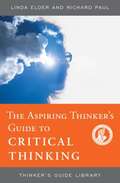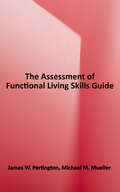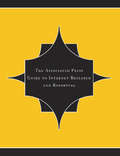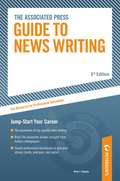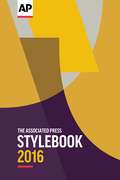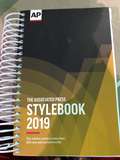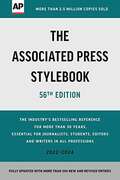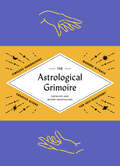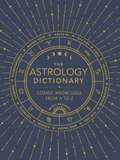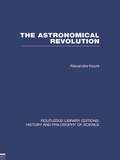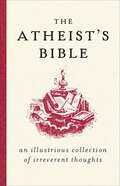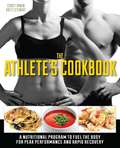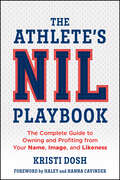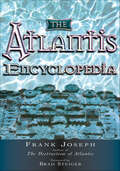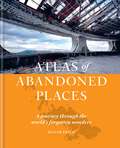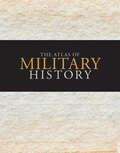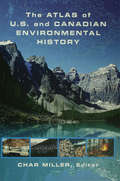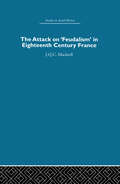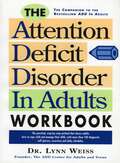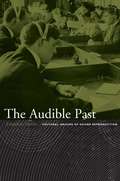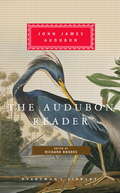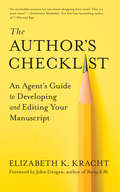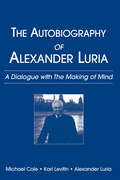- Table View
- List View
The Aspiring Thinker's Guide to Critical Thinking (Thinker's Guide Library)
by Richard Paul Linda ElderThis guide introduces critical thinking concepts and provides strategies for developing one's own critical thinking abilities. Its full-color images and glossy format help capture the attention of today’s students while focusing on the essence of critical thinking as it applies to the world in which we now live. The skills implicit in this guide apply to all subjects. Teachers can use it to design instruction, assignments, and tests in any subject. Students can use it to improve their learning in any content area. The guide focuses on how to analyze and assess thinking, as well as how to develop as fairminded thinkers. It can be used as a supplement to a textbook or as a stand-alone, to teach the fundamentals of critical thinking.
The Assessment of Functional Living Skills Guide
by James W. Partington Michael M. MuellerThe AFLS Guide provides information about the features of the AFLS, how to correctly score items, and how to develop program goals and objectives that clearly define and target the needs of the learner. - The AFLS Guide provides assessment and scoring instructions for each module - Includes recommendations for creating a unique, functional skills program - Functional, adaptive, self-help, practical life skills to maximize independence - Appropriate for children, adolescents, and adults in the home, school, and community setting - Structure of the assessment and skills tracking grid similar to the ABLLS-R - Easy to use for parents, teachers, behavior therapists, and other caregivers.
The Associated Press Guide To Internet Research And Reporting
by Frank BassFrom the editors at the world-renowned Associated Press, a guide to research, writing style, and reporting using the Internet
The Associated Press Guide to News Writing (Third Edition)
by Rene J. CapponA former AP General News Editor offers novices and seasoned professionals practical advice and lively commentary on writing like a pro. He covers all the essentials of researching, generating, and writing: developing a hook, choosing the right words, constructing a good lead, and more.
The Associated Press Stylebook 2016
by The Associated PressThe 2016 edition of The Associated Press Stylebook and Briefing on Media Law includes nearly 250 new or revised entries – including lowercasing internet and web.The AP Stylebook is widely used as a writing and editing reference in newsrooms, classrooms and corporate offices worldwide. Updated regularly since its initial publication in 1953, the AP Stylebook provides fundamental guidelines for spelling, language, punctuation, usage and journalistic style. It is the definitive resource for journalists.Changes in the 2016 Stylebook include:• 50 new and updated technology terms, including emoji, emoticon and metadata• 36 new and updated entries in the food chapter, from arctic char to whisky/whiskey, and eight new and updated entries in the fashion chapter, including normcore and Uniqlo• New entries discouraging the use of child prostitute and mistress; restricting spree to shopping or revelry, not killing; and using the number of firefighters or quantity of equipment sent to a fire, not the number of alarms• DJ is now allowed on first reference, and spokesperson is recognized, in addition to spokesman and spokeswoman• New guidance on the terms marijuana, cannabis and pot; cross dresser and transvestite; accident and crash; notorious and notoriety• A new entry on data journalismWith invaluable additional sections on the unique guidelines for business and sports reporting and on how you can guard against libel and copyright infringement, The AP Stylebook is the one reference that all writers, editors and students cannot afford to be without.
The Associated Press Stylebook 2019
by Associated PressThe style of The Associated Press is the gold standard for news writing. With the AP Stylebook in hand, you can learn how to write and edit with the clarity and professionalism for which their writers and editors are famous. <P><P>The AP Stylebook will help you master the AP's rules on grammar, spelling, punctuation, capitalization, abbreviation, word and numeral usage, and when to use "more than" instead of "over." To make navigating these specialty chapters even easier, the Stylebook includes a comprehensive index. <P><P>Fully revised and updated to keep pace with world events, common usage, and AP procedures, The AP Stylebook is the one reference that all writers, editors and students cannot afford to be without.
The Associated Press Stylebook: 2022-2024
by Associated PressMaster the style guidelines of news writing, editing, and common usage with this indispensable guide perfect for students and professional writers everywhere. <p><p> The style of The Associated Press is the gold standard for news writing. With the AP Stylebook in hand, you can learn how to write and edit with the clarity and professionalism for which their writers and editors are famous. <p><p> The AP Stylebook will help you master the AP’s rules on grammar, spelling, punctuation, capitalization, abbreviation, word and numeral usage, and when to use “more than” instead of “over.” To make navigating these specialty chapters even easier, the Stylebook includes a comprehensive index. <p><p> Fully revised and updated to keep pace with world events, common usage, and AP procedures, the AP Stylebook is the one reference that all writers, editors and students cannot afford to be without.
The Astrological Grimoire: Timeless Horoscopes, Modern Rituals, and Creative Altars for Self-Discovery
by Beatrix Gravesguard ShewolfeFrom the co-hosts of Astral Projection Radio Hour on BFF.fm, a guide to understanding your natal chart, with practices to help you tap into your intuition. This unique astrological perspective invites readers to discover themselves in every sign of the zodiac. Divided into twelve chapters, one for each sign, the book offers horoscopes based on moon phase and &“mood phase&”—emotions and life events—so readers can always find a horoscope that speaks to their current life moment. The Astrological Grimoire guides readers in understanding their birth chart so they can learn how all the signs impact their lives and find the right horoscope for any situation. This holistic and individualized book is ultimately an uplifting way to find meaning in the movements of the universe!
The Astrology Dictionary: Cosmic Knowledge from A to Z
by Donna WoodwellGo beyond the horoscope and master the meaning of the stars with this illustrated gift book that features more than 100 definitions for popular astrology terms that you need to know! There&’s more to understanding the stars than you might think! Whether you&’re just learning the basics of the zodiac or are looking to delve deeper into some new concepts, The Astrology Dictionary has easy-to-understand explanations for over 100 of the most common (and important!) astrological terms. Answer questions like: —What is the cusp between two Sun signs? —What does it mean if your Sun sign is mutable? (Gemini and Sagittarius take note!) —What can your natal chart reveal about your life? (Hint: a lot!) —And if you want to start at the very beginning, what is the zodiac anyway? The Astrology Dictionary has all the answers to your most important astrology questions, from birthing charts and retrograde, to sun signs and elements, and everything in between. This fascinating and practical dictionary explains it all, so you can spend more time discovering what the zodiac means to you.
The Astronomical Revolution: Copernicus - Kepler - Borelli (Routledge Library Editions: History & Philosophy of Science)
by Alexandre KoyreOriginally published in English in 1973. This volume traces the development of the revolution which so drastically altered man’s view of the universe in the sixteenth and seventeenth centuries. The "astronomical revolution" was accomplished in three stages, each linked with the work of one man. With Copernicus, the sun became the centre of the universe. With Kepler, celestial dynamics replaced the kinematics of circles and spheres used by Copernicus. With Borelli the unification of celestial and terrestrial physics was completed by abandonment of the circle in favour the straight line to infinity.
The Atheist's Bible: An Illustrious Collection of Irreverent Thoughts
by Joan KonnerA wise and witty collection of quips, quotes, and musings from the world’s greatest geniuses and jokers, proving that “all thinking men are atheists” (Ernest Hemingway)From Sophocles to Homer Simpson, The Atheist’s Bible celebrates the long and rich tradition of rejecting organized religion. Included here are insights and observations from scientists, writers, philosophers, and comedians throughout history who have questioned the wisdom (and sanity) of pious believers. Far from a cynical polemic, this “bible” shares the same joy, love of beauty, and human wonder that religious books of quotations provide, but with a healthy dose of independent thought and without dogma.
The Athlete's Cookbook: A Nutritional Program to Fuel the Body for Peak Performance and Rapid Recovery
by Brett Stewart Corey IrwinFUEL YOUR FITNESS. This book shows how to perform at the top of your ability by combining its carefully constructed nutrition plan with your personal training and conditioning. Build the ideal diet to power a lean, strong physique with over 100 delicious recipes, like: • Mussels Marinara Spaghetti for Increased Glycogen • Walnut-parmesan Chicken for Maximum Protein • Peanut Butter Crunch Bars for Healthy Fats With day-by-day meal plans and advice on the best pre and post-workout nutrition, The Athlete&’s Cookbook details everything you need to maintain energy and build muscle, keeping you at the top of your game.
The Athlete's NIL Playbook: The Complete Guide to Owning and Profiting from Your Name, Image, and Likeness
by Kristi DoshThe definitive guide for athletes to understand and earn from name, image, and likeness (NIL) rights The first comprehensive guide designed to help college, high school, and youth athletes navigate the name, image, and likeness (NIL) rights they've gained since 2021, The Athlete's NIL Playbook walks readers through NIL rules, opportunities, and red flags, showing them how to build a personal brand, find deals, reach out to companies, and negotiate terms. Along with real-life examples, exercises, and pitch templates, this book includes case studies from college and high school athletes who have successfully navigated this burgeoning market: the Cavinder Twins, Olivia Dunne, Travis Hunter, Chase Griffin, Emily Cole, and many more. Written by Kristi Dosh, a seasoned sports business reporter and founder of a nationally-recognized news platform covering the business of college sports, this book covers aspects of NIL including: The types of opportunities available (social media marketing, lessons, camps/clinics, merchandise, personal appearances, and more) Whether you need an agent or not, and how to find the right one if you do Working with third parties like collectives and marketplaces and protecting/registering your own intellectual property A true playbook for leveraging and capitalizing on NIL monetization opportunities, The Athlete's NIL Playbook is an essential read for athletes and parents seeking to ensure athletic success is matched with lucrative financial and career opportunities that can go far beyond graduation.
The Atlantis Encyclopedia
by Frank JosephA handbook of Atlantean information for general readers and specialists alike!This is an invaluable, one-of-a-kind reference. Unlike most other books on the subject, The Atlantis Encyclopedia offers fewer theories and more facts. Although it does not set out to prove the sunken capital actually existed, The Atlantis Encyclopedia musters so much evidence on its behalf, even skeptics may conclude that there must be at least something factual behind such an enduring, indeed global legend. You'll learn:•What was Atlantis?•Where was it located?•How long ago did it flourish?•How was it destroyed?•What became of its survivors?•Have any remains of Atlantis ever been found?•Will Atlantis ever be found?•Did Atlantis have any impact on America?
The Atlas of Abandoned Places
by Oliver SmithThe globe is littered with forgotten monuments, their beauty matched only by the secrets of their past.A glorious palace lies abandoned by a fallen dictator. A grand monument to communism sits forgotten atop a mountain. Two never-launched space shuttles slowly crumble, left to rot in the middle of the desert. Explore these and many more of the world's lost wonders in this atlas like no other.With remarkable stories, bespoke maps and stunning photography of fifty forsaken sites, The Atlas of Abandoned Places travels the world beneath the surface; the sites with stories to tell, the ones you won't find in any guidebook.Award-winning travel writer Oliver Smith is your guide on a long-lost path, shining a light on the places that the world forgot.Locations featured in the book include:Europe: Maunsell Forts, Aldwych Station, Paris Catacombs, La Petite Ceinture, Craco, Teufelsberg, Beelitz-Heilstätten, Red Star Train Graveyard, Pyramiden, Salpa Line, Buzludzha Monument, Pripyat, Wolf's Lair, Project Riese, Sarajevo Bobsleigh Track, Albanian Bunkers, Rummu QuarryThe Americas & the Carribean: New Bedford Orpheum Theatre, City Hall Station, Bodie, The Boneyards of Western USA, Bannerman Castle, Palace of Sans Souci, Montserrat Exclusion Zone, Ciudad Perdida, Humberstone and Santa Laura, Uyuni Train Cemetery, FordlândiaThe Middle East & the Caucasus: Kayaköy, Burj Al Babas, Varosha, Tskaltubo, Palaces of SaddamAsia: Ryugyong Hotel, Buran at Baikonur, Mo'ynoq Ship Graveyard, Aniva Lighthouse, Hô' Thuy Tiên Waterpark, Fukushima Red Zone, HashimaOceania: Wittenoom, Wrecks of Homebush Bay, Port Arthur, MS World Discoverer, Second World Remains of Papua New GuineaAfrica: Shipwrecks of the Skeleton Coast, Kolmanskop, Mobutu's Gbadolite, Mos Espa, São Martinho dos Tigres
The Atlas of Abandoned Places
by Oliver SmithThe globe is littered with forgotten monuments, their beauty matched only by the secrets of their past.A glorious palace lies abandoned by a fallen dictator. A grand monument to communism sits forgotten atop a mountain. Two never-launched space shuttles slowly crumble, left to rot in the middle of the desert. Explore these and many more of the world's lost wonders in this atlas like no other.With remarkable stories, bespoke maps and stunning photography of fifty forsaken sites, The Atlas of Abandoned Places travels the world beneath the surface; the sites with stories to tell, the ones you won't find in any guidebook.Award-winning travel writer Oliver Smith is your guide on a long-lost path, shining a light on the places that the world forgot.Locations featured in the book include:Europe: Maunsell Forts, Aldwych Station, Paris Catacombs, La Petite Ceinture, Craco, Teufelsberg, Beelitz-Heilstätten, Red Star Train Graveyard, Pyramiden, Salpa Line, Buzludzha Monument, Pripyat, Wolf's Lair, Project Riese, Sarajevo Bobsleigh Track, Albanian Bunkers, Rummu QuarryThe Americas & the Carribean: New Bedford Orpheum Theatre, City Hall Station, Bodie, The Boneyards of Western USA, Bannerman Castle, Palace of Sans Souci, Montserrat Exclusion Zone, Ciudad Perdida, Humberstone and Santa Laura, Uyuni Train Cemetery, FordlândiaThe Middle East & the Caucasus: Kayaköy, Burj Al Babas, Varosha, Tskaltubo, Palaces of SaddamAsia: Ryugyong Hotel, Buran at Baikonur, Mo'ynoq Ship Graveyard, Aniva Lighthouse, Hô' Thuy Tiên Waterpark, Fukushima Red Zone, HashimaOceania: Wittenoom, Wrecks of Homebush Bay, Port Arthur, MS World Discoverer, Second World Remains of Papua New GuineaAfrica: Shipwrecks of the Skeleton Coast, Kolmanskop, Mobutu's Gbadolite, Mos Espa, São Martinho dos Tigres
The Atlas of Military History: An Around-the-world Survey Of Warfare Through The Ages
by Amanda LomazoffA comprehensive guide to the armed conflicts that have shaped our civilizations and our lives.Aggression. Disruption. Violence. Mortality. The components of war are familiar to us all, but it&’s often hard to understand how these battles throughout history continue to affect us today. The story of our world, from its earliest beginnings thousands of years BCE to today, is the often the story of our conflicts.The Atlas of Military History offers a fascinating look at the many wars that have been fought over land, independence, and other factors all over the globe. Organized into sections based on location and then in chronological order, this compendium covers everything from the Punic Wars in Carthage that began in 247 BCE, to the conquest of Constantinople in 1453, to World War II, to the recent Arab Spring. Full-color photos and maps, as well as highlighted sections on legendary leaders, battles, and weapons, are included. Perfect for students or anyone wanting to know more about this important aspect of our world, the Atlas of Military History is a complete portrait of our conflicts and resolutions.
The Atlas of Pern
by Karen Wynn FonstadPern has a varied climate, ranging from the rainforest of Nerat to the Snowy Wastes protect the more habitable land from the cold, blocking all but the worst of the icy polar winds. The equator runs midway between the two continents; the Snowy Wastes are approximately equidistant from it.
The Atlas of U.S. and Canadian Environmental History
by Char MillerThis visually dynamic historical atlas chronologically covers American environmental history through the use of four-color maps, photos, and diagrams, and in written entries from well known scholars.Organized into seven categories, each chapter covers: agriculture * wildlife and forestry * land use and management * technology and industry * polluti
The Attack on Feudalism in Eighteenth-Century France
by J.Q.C. MackrellFirst published in 2006. Routledge is an imprint of Taylor & Francis, an informa company.
The Attention Deficit Disorder in Adults Workbook
by Lynn Weiss PhDOver 200,000 copies of Attention Deficit Disorder in Adults, 3rd edition, have been sold. Since its last revision, dozens of new treatments and philosophies about ADD and ADHD have met with storms of controversy and great media attention. Time and again, Lynn Weiss cuts through the noise and gets down to the point in a human, caring, and professional way. People turn to the Weiss library for a breath of fresh air on the ADD turmoil. This workbook not only touches on and dispels the most recent clinical findings, but it also emphasizes the bigger perspective, focusing on the empowerment and diversity issues facing all of us on the A.D.D. continuum today. It persuades readers to work through their challenges with practical, prescriptive exercises and insights.
The Audible Past: Cultural Origins of Sound Reproduction
by Jonathan SterneThe Audible Past explores the cultural origins of sound reproduction. It describes a distinctive sound culture that gave birth to the sound recording and the transmission devices so ubiquitous in modern life. With an ear for the unexpected, scholar and musician Jonathan Sterne uses the technological and cultural precursors of telephony, phonography, and radio as an entry point into a history of sound in its own right. Sterne studies the constantly shifting boundary between phenomena organized as "sound" and "not sound. " In The Audible Past, this history crisscrosses the liminal regions between bodies and machines, originals and copies, nature and culture, and life and death. Blending cultural studies and the history of communication technology, Sterne follows modern sound technologies back through a historical labyrinth. Along the way, he encounters capitalists and inventors, musicians and philosophers, embalmers and grave robbers, doctors and patients, deaf children and their teachers, professionals and hobbyists, folklorists and tribal singers. The Audible Past tracks the connections between the history of sound and the defining features of modernity: from developments in medicine, physics, and philosophy to the tumultuous shifts of industrial capitalism, colonialism, urbanization, modern technology, and the rise of a new middle class. A provocative history of sound, The Audible Past challenges theoretical commonplaces such as the philosophical privilege of the speaking subject, the visual bias in theories of modernity, and static descriptions of nature. It will interest those in cultural studies, media and communication studies, the new musicology, and the history of technology.
The Audubon Reader
by Richard Rhodes John James AudubonThis unprecedented anthology of John James Audubon's lively and colorful writings about the American wilderness reintroduces the great artist and ornithologist as an exceptional American writer, a predecessor to Thoreau, Emerson, and Melville.Audubon's award-winning biographer, Richard Rhodes, has gathered excerpts from his journals, letters, and published works, and has organized them to appeal to general readers. Rhodes's unobtrusive commentary frames a wide range of selections, including Audubon's vivid "bird biographies," correspondence with his devoted wife, Lucy, journal accounts of dramatic river journeys and hunting trips with the Shawnee and Osage Indians, and a generous sampling of brief narrative episodes that have long been out of print--engaging stories of pioneer life such as "The Great Pine Swamp," "The Earthquake," and "Kentucky Barbecue on the Fourth of July." Full-color reproductions of sixteen of Audubon's stunning watercolor illustrations accompany the text.The Audubon Reader allows us to experience Audubon's distinctive voice directly and provides a window into his electrifying encounter with early America: with its wildlife and birds, its people, and its primordial wilderness.(Book Jacket Status: Jacketed)
The Author’s Checklist: An Agent’s Guide to Developing and Editing Your Manuscript
by Elizabeth K. KrachtAn Indispensable Guide for All Writers in All Genres The bad news: even really good manuscripts have weak spots that are enough to garner rejections from agents and publishers. The good news: most of these problems are easy to fix — once the writer sees and understands them. After several years of evaluating manuscripts, literary agent Elizabeth Kracht noticed that many submissions had similar problems, so she began to make a list of the pitfalls. The Author&’s Checklist offers her short, easy-to-implement bites of advice, illustrated by inspiring — and cautionary — real-world examples. Most aspiring authors yearn for a friend in book publishing. The Author&’s Checklist is just that.
The Autobiography of Alexander Luria: A Dialogue with The Making of Mind
by Michael Cole Karl Levitin Alexander R. LuriaAlexander Luria was one of the most influential psychologists of the 20th century. His official autobiography was written as a citizen of the Soviet Union, and while it provides a compelling story of his lifelong devotion to developing a comprehensive theory of the biological and cultural foundations of human nature, it is conspicuous for the absence of information about the social context of his work and his personal struggles to be a decent person in indecent times. The current "dialogic autobiography" brings the vitality of Luria's ideas back to life. Michael Cole and Karl Levitin, both of whom knew Luria well and have written about his life and work, have written a carefully researched introduction and epilogue to the original autobiography. They provide readers, for the first time, with information about the social and personal contexts of Luria's remarkable achievements. Their account is supplemented by downloadable resources with reminiscences of leading psychologists from around the world who knew and worked with Luria. At last, Luria's life and science are brought together in a single volume.The book will appeal to psychologists, neuropsychologists, and other scientists interested in Luria's life achievements.
